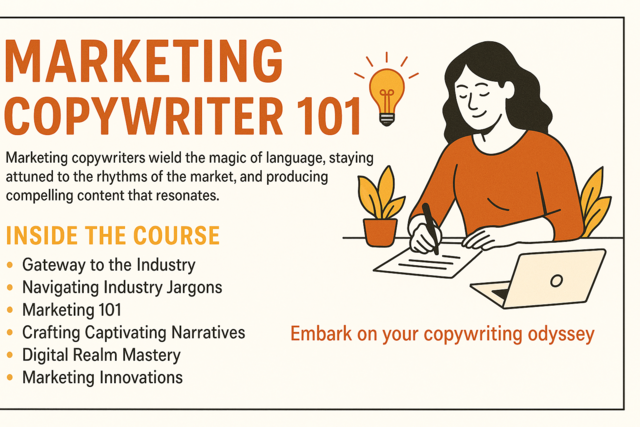ABCs of Technical Writing
Master the Art of Technical Writing

3 Hours average completion time
0.3 CEUs
11 Lessons
18 Exams & Assignments
118 Discussions
11 Videos
13 Reference Files
82 Articles
Mobile Friendly
Last Updated January 2026
Demystifying Technical Writing
In our technologically-driven world, the ability to convey complex concepts in a clear, concise, and accessible manner is invaluable. Have you ever grappled with assembling a piece of furniture, only to find relief in the user-friendly guide accompanying it? Or perhaps you've navigated a new software application with the aid of an intuitive online help system? These are tangible examples of technical writing, a discipline that bridges the gap between technical experts and the general public.
Course Overview:
Technical writing operates at the intersection of technology and communication. It's a discipline that involves crafting detailed, user-friendly content, whether it's for product manuals, online help systems, or instructional videos. As technology permeates every sector, from healthcare to finance, and from entertainment to agriculture, the demand for skilled technical writers has surged.
Whether you're a professional in a tech-centric industry, a writing enthusiast with a penchant for technology, or someone intrigued by the prospect of a career in technical writing, this course offers a comprehensive introduction to the multifaceted world of technical writing.
Course Highlights:
-
What is Technical Writing? Delve into the core principles of technical writing, exploring its significance and wide-ranging applications.
-
Projects for Technical Writers: A deep dive into the myriad projects that a technical writer might undertake, from creating user manuals to designing interactive tutorials.
-
The Technical Writing Process: A step-by-step guide on structuring, drafting, and refining technical documents.
-
How to Write Effectively: Techniques and strategies to ensure clarity, precision, and user-friendliness in your writing.
-
Teaching an Alien to Drive: An engaging exercise that challenges you to explain a familiar concept to an unfamiliar audience, emphasizing the importance of perspective in technical writing.
-
The First End User, You: The significance of self-review and experiencing the user's journey firsthand.
-
Getting It Done: Discover how project management skills are integral to a technical writer's success.
-
Words, Pictures, and Links: Explore the diverse formats in which technical content can be presented, from written documents to multimedia.
-
Breaking into Technical Writing: Tips and guidance for those eager to launch a career in technical writing.
-
The Tech Writer's Toolbox: A compilation of essential tools, software, and resources that can elevate the quality of your work.
-
Staying in Touch: Emphasizing the importance of continuous learning and staying updated in this ever-evolving field.
Real-World Implications:
Consider the launch of a revolutionary health-monitoring app. While developers focus on coding and design, it's the technical writer's responsibility to ensure that users can seamlessly navigate the app, understand its features, and utilize it effectively. This might involve creating a detailed FAQ section, interactive video tutorials, or a comprehensive user guide.
Who is this Course For?
-
Industry Professionals: Enhance your ability to communicate intricate technical details to clients, stakeholders, and non-technical colleagues.
-
Aspiring Writers: Cultivate a specialized skill set that's in high demand across a spectrum of industries.
-
Career Changers: Looking for a dynamic, rewarding career? Delve into technical writing and discover a world where technology meets creativity.
In conclusion, as we progress further into a technology-dominated era, the role of a technical writer becomes increasingly central. This course promises not only to introduce you to the foundational concepts of technical writing but also to equip you with practical skills and insights that are immediately applicable in the real world. Dive in, and unravel the art and science of technical writing!
- Utilizing diverse media formats
- Innovating with interactive content
- Understanding technical writing processes
- Adapting to audience needs dynamically
- Applying digital tools to technical writing
- Managing projects and timelines effectively
- Researching complex concepts efficiently
- Navigating technical writing careers
- Communicating technical concepts to non-technical audiences
- Enhancing user engagement through storytelling
- Crafting clear
- concise documentation
-

Sustainable Development for Business
-

The Art of Setting Goals
-

Team Building 101
-

Paranormal Romance Writing
-

Mystery Writing
-

Kaizen 101 - An Introduction
-

Financial Analysis 101: Planning and Control
-

Strategic Planning
-

Procurement Management
-

Report Writing 101
-

Writing Women's Fiction
-

How to Write Case Studies
-

Nonfiction Writing 101
-

Write to Win: Secrets of Persuasive Writing
-

Freelance Writing 101
-

Advertising Copywriter
-

Writing the Great American Short Story
-

Writing Help Course Bundle
-

Lean Management
-

Advertising, Marketing and Sales Writing
-

Marketing Copywriter 101
-

Journalism 101
-

Novel Writing 101
-

Creative Writing for Beginners
-

Creative Writing 101
